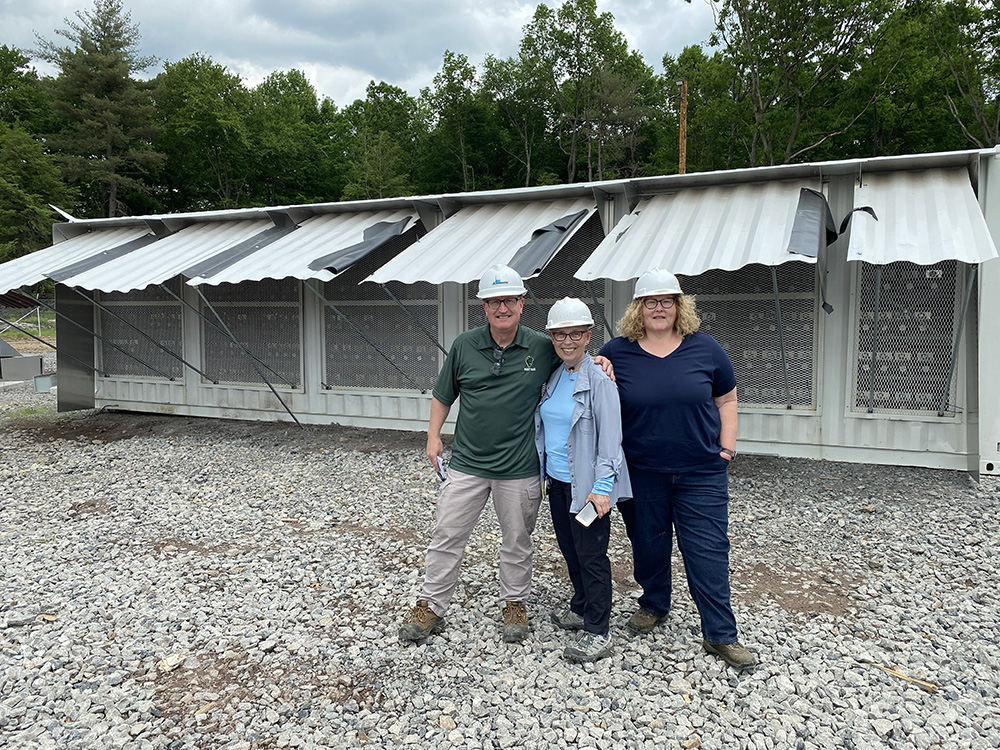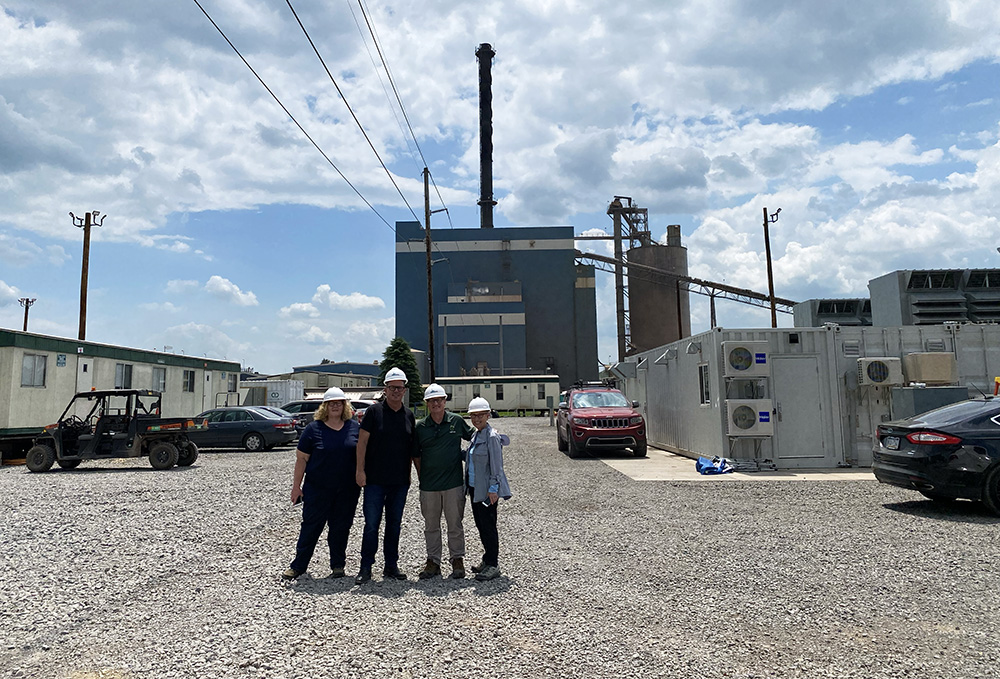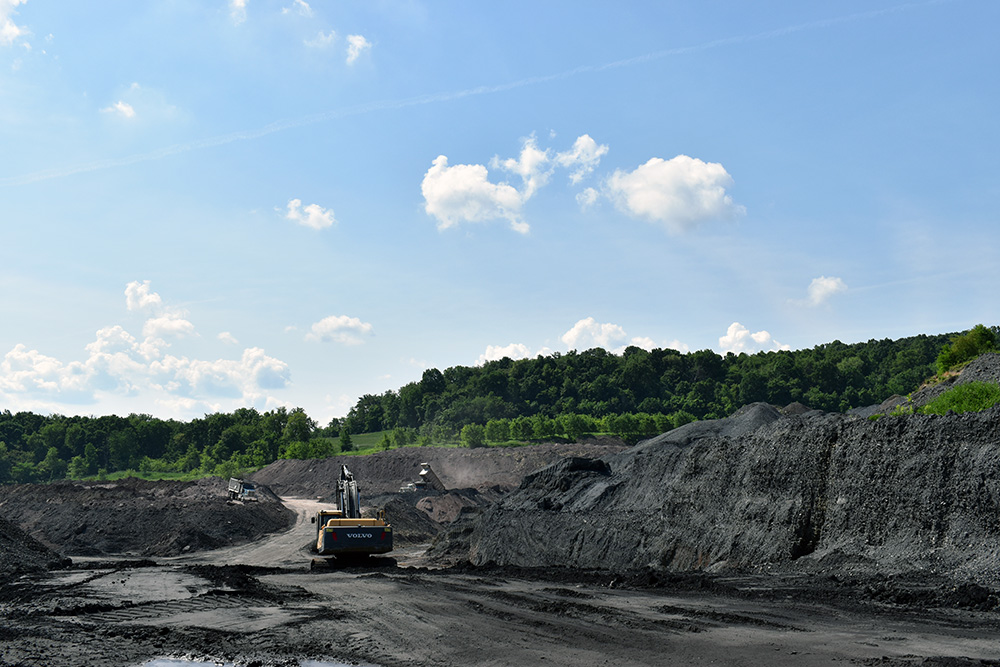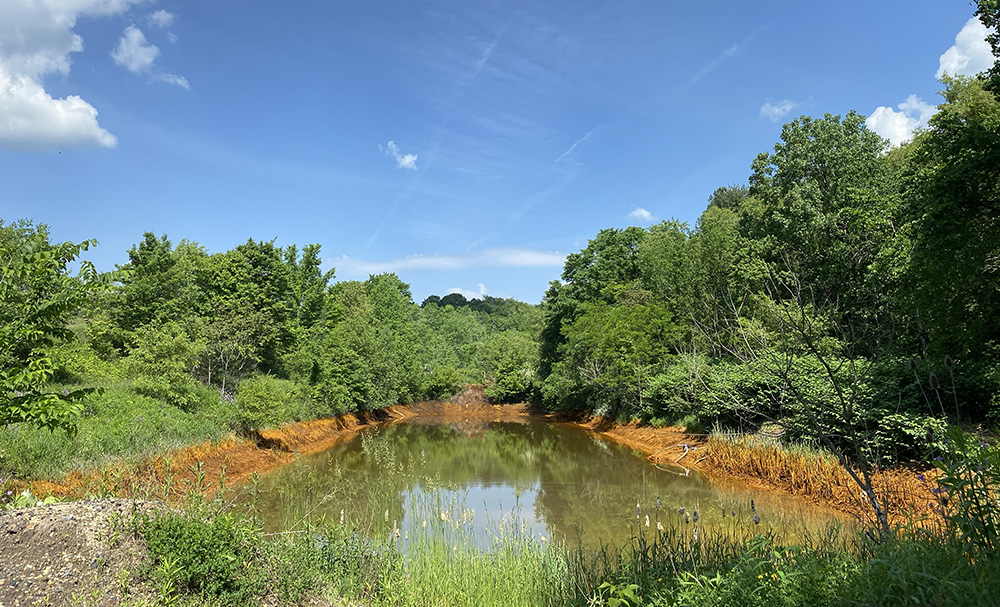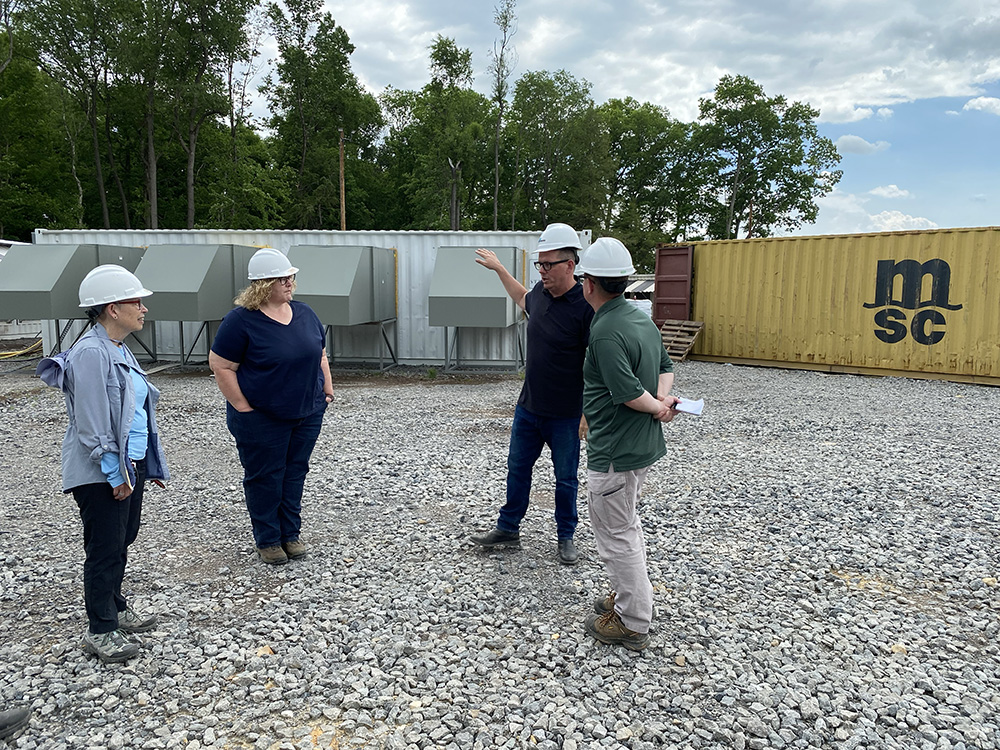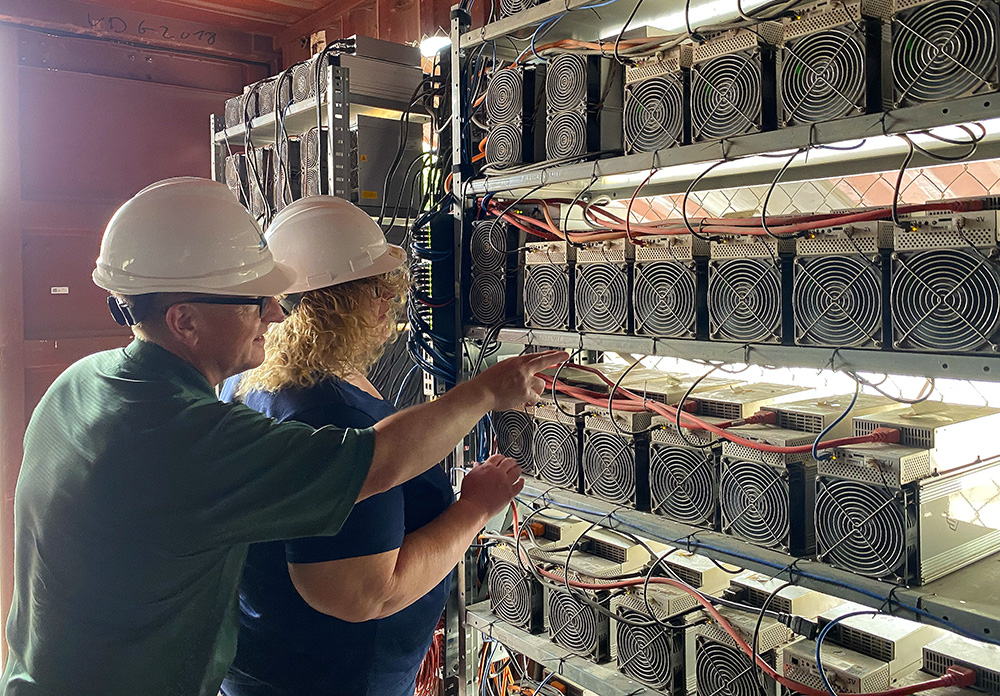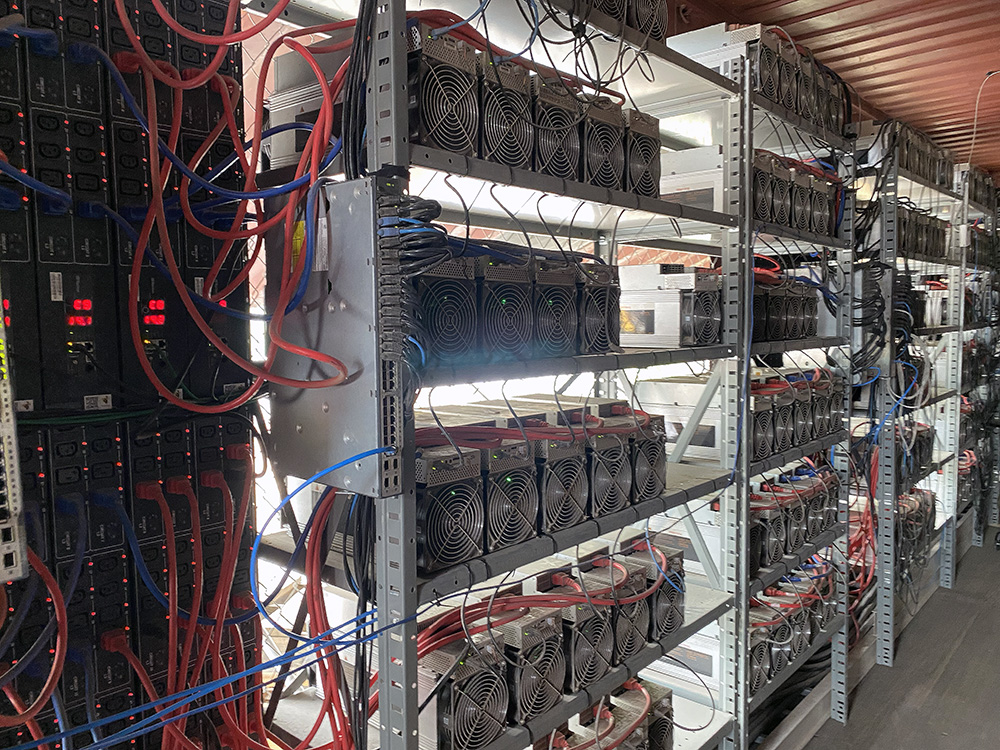Rowland School of Business Faculty Tour Bitcoin Mining Facility to Further Cryptocurrency Education
"Companies using cryptocurrencies as a part of their business model will be looking for business and accounting professionals with first-hand knowledge of and experience with virtual assets. The aim of our course is to start students on their crypto journey with good habits, reliable information and the beginnings of a personal roadmap."
The sound that emanates from the Scrubgrass Power Plant in Venango County isn't quite the crisp cha-ching of a cash register.
It's more of a whirring, low-pitched hum, but even still, the noise generated by hundreds of Bitcoin miners at the 650-acre site is symbolic of dollar signs. The cube-shaped machines, housed in upcycled shipping containers, mine hundreds of thousands of dollars in Bitcoin per day, which is a digital currency that is not overseen by banks, governments or other centralized entities. The machines generate new Bitcoins into circulation and solve complex math problems to verify currency transactions.
Point Park University economics and finance faculty Angela Isaac, Ph.D., and Lee Sullenger, as well as accounting professor Cheryl Clark, CPA, MBA, recently explored Stronghold Digital Mining's Bitcoin mining operation in Kennerdell, Pa. Isaac and Sullenger are currently teaching an online special topics course titled, "Cryptocurrencies: The Good, the Bad, and the Ugly," which provides an introduction to cryptocurrencies and other virtual assets. Clark attended the site visit to build upon the continuing education she recently completed through the American Institute of Certified Public Accountants (AICPA) regarding blockchain evolution and technology concepts.
The material covered in Point Park's cryptocurrencies course includes:
- Overview and basic terminology of cryptocurrencies
- Types of virtual assets and how to create them
- The virtual marketplace, including a view into the players and industry thought leaders
- Investor experiences
- Risk management
- Career opportunities
The course is open to all students, faculty and staff in the University and has no pre-requisites. It is especially valuable for students in the economics and finance, accounting or MBA programs. The next offering is in Fall 2022.
The field trip to Stronghold's operation, which included a tour with Kit Mueller, the company's vice president of corporate development, was an eye-opening experience for the group. First they visited a coal mine site in Russellton, Pa., from which Stronghold takes coal refuse and transports it to its Kennerdell location to power its Bitcoin miners. The company seeks to clean up previously abandoned mine sites while utilizing once-unusable coal waste material as an energy source. Then they got to see the Bitcoin miners at the Scrubgrass Power Plant up-close and learn about the evolving industry from Stronghold's perspective.
In the Q&A below, learn about the faculty's takeaways and how their experience will factor into their classroom instruction.
Angela Isaac, Ph.D.
Professor, economics and finance and co-chair of the Department of Business Analytics and Technology
What motivated you to offer this course?
There is so much popular interest in cryptocurrencies, particularly among young investors. We want to provide a good understanding of cryptocurrencies so that our students can avoid common pitfalls and know how to do their own research for positive investment experiences. We also have enthusiasts among our faculty and staff, including President Green!
How will the visit to Stronghold inform future lessons in the course?
Nothing beats visiting an actual mining operation and seeing how a holistic approach to land reclamation, power generation and Bitcoin mining can be successful. To have Stronghold in our backyard is a real gift to a cryptocurrency course. We plan to continue inviting executives from Stronghold to speak to our class and encourage students to participate in the site visits. We're very fortunate to have the relationship with Stronghold so that Point Park students can learn from a real-world example of Bitcoin mining.
Why is it important to you as a faculty member to have these kinds of experience?
One of the reasons I am a faculty member in the Rowland School of Business is the emphasis on experiential learning for both students and faculty. I'm supported in the professional work I do in my discipline, and we're able to offer innovative classes like this, which include internationally recognized speakers and site visits like Stronghold. I'm learning alongside our students, given how dynamic this topic is.
Lee Sullenger
Adjunct professor, economics and finance
How did you/Point Park come to develop this relationship with Stronghold, and what led to the idea of doing a site visit?
I originally discovered Stronghold while researching the contention that Bitcoin mining was a net negative for the environment. I was both pleased and surprised to find this is not the case and that Stronghold provides a tangible public good to the communities of western Pennsylvania. While mapping out the course content, I was determined to include the Stronghold story so students could gain an understanding of the truth behind Bitcoin as a public good. The company reacted positively when I reached out to propose an interview with co-chairman William B. Spence and a visit to the facilities as part of our module on cryptocurrency mining. Stronghold is a tangible example of the leading role in the cryptocurrency world played by innovators and industry in our region. I'll definitely seek to include a tour at their facility in future iterations of the course.
Describe a moment from the site visit that was particularly impactful for you.
It was discomforting to see the pollution left behind by previous coal mining companies at the Russellton mine site. I think we all can appreciate that they worked hard to pull coal from the ground to literally help build the 20th century with steel. I just wish the land had been better cared for in the process. It was impressive to see the Stronghold trucks, up to 70 per day, taking the coal refuse out of the ground to be cleanly burned at the Scrubgrass Power Plant.
Another impressive moment was that as we approached Scrubgrass, there were zero visible emissions from the smokestack, yet the plant was running at 100% capacity.
Finally, and most significant for me, were the sights, sounds and high-temperature air coming from the Bitcoin miners. It was at that moment that the simple idea of burning waste coal recovered from a polluted site to generate electricity to mine Bitcoin became an absolute reality for me. This company is literally cleaning polluted land and producing digital money in the process! It was a beautiful thing to see.
What do you want students to know about cryptocurrency as it pertains to their future careers in economics and finance?
Cryptocurrencies represent a significant opportunity for students. Companies using cryptocurrencies as a part of their business model will be looking for business and accounting professionals with first-hand knowledge of and experience with virtual assets. The aim of our course is to start students on their crypto journey with good habits, reliable information and the beginnings of a personal roadmap.
Cheryl Clark, MBA, CPA
Professor, accounting, and co-chair of the Department of Business Analytics and Technology
Why is it important to you as a faculty member and accounting professional to learn about emerging technologies?
The technology used to verify Bitcoin transactions using a distributed ledger and blockchain is an industry disruptor for accounting. I have been increasing my knowledge of these technologies with my required CPA continuing education coursework over the past few years. This stuff has implications for many different facets of the practice of accounting. It is important for me as an educator and industry professional to keep up with this technology's evolution.
What's one of your key takeaways from the trip to Stronghold?
I’m relieved that there is a company like Stronghold trying to make a difference cleaning up coal refuse, which is all over the place in our region. They are doing it with Bitcoin, employing local people and making a difference in rural areas that need help.
More About: economics and finance, faculty, Rowland School of Business, accounting


